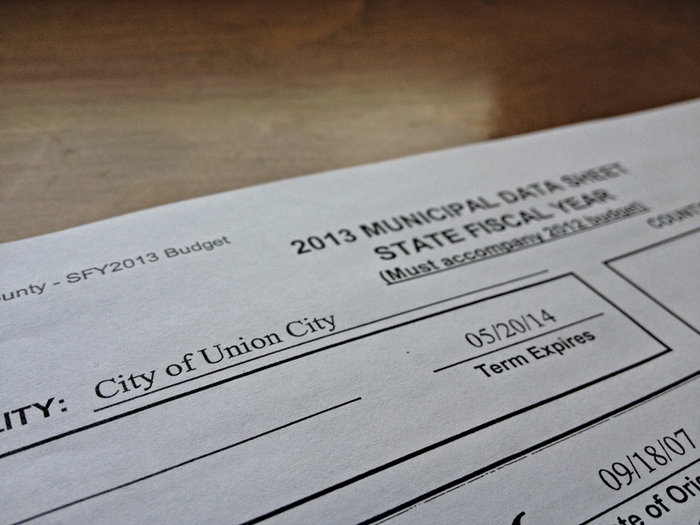The Union City Board of Commissioners voted on Friday, Nov. 9 to approve a $104.8 million 2012-2013 city budget with no increase in the tax rate.
The budget covers the 2013 fiscal year, which began on July 1 and will end on June 30, 2013. It was introduced at a Commissioners Meeting on Oct. 11, is down approximately $400,000 from the 2012 budget.
The most glaring difference from last year’s budget is that the state took away $2 million in aid for the Urban Enterprise Zone (UEZ) program, which assists business districts in urban areas. As part of the program, businesses in the state-designated zones can charge lower sales tax, and they get to keep the proceeds for hiring police and making capital improvements in the district. But Gov. Chris Christie is phasing the program out.
“I’m not too concerned about the UEZ loss,” said Mayor Brian Stack. “It happened to a lot of towns, and I think we’re in better shape than others to absorb that loss. We did a good job of incorporating [infrastructure projects] into our Department of Public Works (DPW) and they do a great job regardless.”
“This number doesn’t mean an increase in taxes.” – Mayor Brian Stack
____________
“This number doesn’t mean an increase in taxes,” he said. “Most likely they will stay the same. There’s a slight chance they could decrease.”
What’s up
Stack explained that the $63.7 million levy, meaning the total amount the city expects to collect in taxes, is higher than last year due to increases in two of the budget’s larger expenditures: the amount the city owes its employees in health benefits ($16.67 million, an increase from $15.2 million) and the city’s contribution to North Hudson Regional Fire and Rescue ($18.6 million, as opposed to $17.9 million). The NHRFR is a fire department for five towns, and each town contributes to its budget.
Even with the loss of the UEZ funds, the city will attempt to spend nearly a half-million less than it did in 2012, and to do so with only $29,000 in estimated overexpenditures.
Stack credits a sharp decrease in the number of city employees, paired with retirements and a $2.8 million grant from the Port Authority of New York and New Jersey with easing the effects of the lost UEZ funds.
The $2.8 million grant is meant to compensate for traffic that tends to clog the city’s streets when the Port Authority is doing construction on Route 495.
There were retirements last year in offices like the city clerk’s office and the tax collection office. Several senior police officers, some of whom enjoy salaries upwards of $100,000, are approaching retirement as well.
Stack said his goals can be seen in the budget, in particular efforts to keep the city cleaner and safer.
“I try to put aside about $17 to $20 million a year for infrastructure. We have a lot of roads that haven’t been paved in probably about 70 years,” he said. “I’m also looking to further improve street lighting. That’s a big thing of mine: I believe spending on street lights is always worth it. It deters crime, encourages people to be outside. Makes the town a brighter place to live.”
The 2013 budget reflects this, including $1.11 million for street lighting.
The budget also sets aside several million to keep Union City clean: $1.93 million for street cleaning (up from $1.82 million in 2012) and $3.99 million for solid waste disposal (as opposed to last year’s $3.75 million).
“We have street cleaning seven days a week, and there’s a lot of garbage, because we’re the most densely populated city in the country” he said.
Much of the money goes towards vehicle upkeep and fuel.
“Different guys drive those trucks all the time. People drive differently, people pump the brakes differently… it wears down the trucks,” he said.
Some of the city’s revenues, meanwhile, spell good news for Union City in 2013. In particular, the city earned nearly $1 million last year in construction permits.
“That means a lot of people are building,” he said. “And that’s always good for the economy.”
Furthermore, the city makes a healthy amount in fees owed by the Board of Education, which operates on a separate budget. For example, the Bruce Walter Recreational Center, located on Sixth Street and Central Avenue, is used by public schools for lunch and recreation four hours a day, guaranteeing the city $300,000 per year, and police officers assigned to schools brings in $598,000. In all, the board will pay the city $1.4 million.
One of the budget’s greatest strengths lies in the relatively small amount bonded, or borrowed, from banks in order to fund the city, Stack said. This allows the city to remain on a fiscal calendar, while other municipalities are forced into switching to a calendar year so that they can borrow money more easily. Without borrowing, Stack can be flexible and innovative with how he chooses to spend the city’s money.
“Then when that rainy day comes when you need it, it’s there,” he said.
Dean DeChiaro may be reached at deand@hudsonreporter.com
